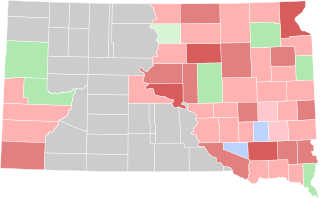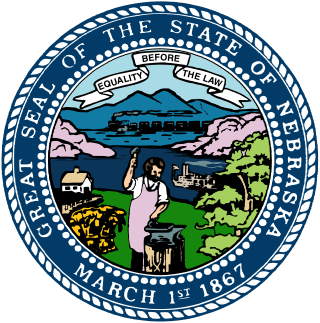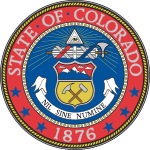
The People's Party, usually known as the Populist Party or simply the Populists, was an agrarian populist political party in the United States in the late 19th century. The Populist Party emerged in the early 1890s as an important force in the Southern and Western United States, but declined rapidly after the 1896 United States presidential election in which most of its natural constituency was absorbed by the Bryan wing of the Democratic Party. A rump faction of the party continued to operate into the first decade of the 20th century, but never matched the popularity of the party in the early 1890s.

Davis Hanson Waite was an American politician. He was a member of the Populist Party, and he served as the eighth Governor of Colorado from 1893 to 1895.

The North Carolina United States Senate election of 1978 was held on November 7, 1978 as part of the nationwide elections to the Senate. The general election was between the Republican incumbent Jesse Helms and the Democratic nominee John Ingram. Helms won re-election, by a slightly wider margin than in 1972. This was the first Senate election where Republicans were re-elected.

A 2011 special election in New York's 26th congressional district was held on May 24, 2011 to fill a seat in the U.S. Congress for New York's 26th congressional district. The seat had been vacated due to the February 2011 resignation of married Rep. Chris Lee, who left office amid a scandal involving flirtatious emails and a shirtless picture he sent to a woman he met on Craigslist. Four candidates competed in the election: Republican Assemblymember Jane Corwin; Democrat Erie County Clerk Kathy Hochul; Green Party candidate Ian Murphy, editor of the Buffalo Beast; and independent candidate Jack Davis, a businessman running on the Tea Party line. On Election Day, Hochul won an upset victory, prevailing over Corwin by a margin of 47.24%-42.28%; Davis received 8.99% of the vote.

The 1924 United States presidential election in New Jersey took place on November 4, 1924. All contemporary 48 states were part of the 1924 United States presidential election. Voters chose 14 electors to the Electoral College, which selected the president and vice president.

The 1892 South Dakota gubernatorial election was held on November 8, 1892. Incumbent Republican Governor Arthur C. Mellette declined to seek re-election to a third term. Former territorial legislator Charles H. Sheldon was nominated by the Republican Party as Mellette's replacement, and he faced former legislator Abraham Lincoln Van Osdel, a leader in the South Dakota Farmers' Alliance and the nominee of the Independent Party, along with Democratic nominee Peter Couchman, in the general election. The result was largely a replay of the 1890 election, with Sheldon winning by a large margin, but only a plurality, and Van Osdel taking second place over Couchman.
Joseph Church Helm was a jurist from Colorado. He served as a Colorado state representative, a Colorado state senator, and as an associate justice and chief justice of the Colorado Supreme Court. He ran for governor in 1892 and was defeated by Davis Hanson Waite.

The 1896 Colorado gubernatorial election was held on November 3, 1896. Democratic nominee Alva Adams defeated People's Party nominee Morton Shelley Bailey with 46.22% of the vote.

The 1894 Colorado gubernatorial election was held on November 6, 1894. Republican nominee Albert McIntire defeated People's Party incumbent Davis Hanson Waite with 51.95% of the vote.

The 1892 Kansas gubernatorial election was held on November 8, 1892. People's Party nominee Lorenzo D. Lewelling defeated Republican nominee Abram W. Smith with 50.04% of the vote.

The 1892 Connecticut gubernatorial election was held on November 8, 1892. It was a rematch of the 1890 Connecticut gubernatorial election. Democratic nominee Luzon B. Morris defeated Republican nominee Samuel E. Merwin with 50.31% of the vote.

The 1892 New Hampshire gubernatorial election was held on November 8, 1892. Republican nominee John Butler Smith defeated Democratic nominee Luther F. McKinney with 50.17% of the vote.

The 1892 Rhode Island gubernatorial election was held on April 6, 1892. Republican nominee Daniel Russell Brown defeated Democratic nominee William T. C. Wardwell with 50.22% of the vote.

The 1903 Iowa gubernatorial election was held on November 3, 1903. Incumbent Republican Albert B. Cummins defeated Democratic nominee J. B. Sullivan with 57.14% of the vote.

The 1892 Tennessee gubernatorial election was held on November 8, 1892. Democratic nominee Peter Turney defeated Republican nominee George W. Winstead, and Incumbent Governor John P. Buchanan, who ran as a Populist, with 47.86% of the vote.

The 1892 Idaho gubernatorial election was held on November 8, 1892.
Julie Yamamoto is an American politician and retired educator. A member of the Republican Party, she is serving as a member of the Idaho House of Representatives from the 11th District. She has served at the helm of the House Education Committee since 2023.

The 1944 Missouri lieutenant gubernatorial election was held on November 7, 1944. Democratic nominee Walter Naylor Davis defeated Republican nominee James G. Blaine with 50.85% of the vote.
Elections are held in South Bend, Indiana, to elect the city's mayor. Such elections are regularly scheduled to be held every four years, in the year immediately preceding that of United States presidential elections.

The 1898 Nebraska gubernatorial election was held on November 8, 1898. Incumbent Populist Governor Silas A. Holcomb did not stand for re-election. Populist and Democratic fusion nominee William A. Poynter defeated Republican nominee Monroe Hayward with 50.19% of the vote.



















